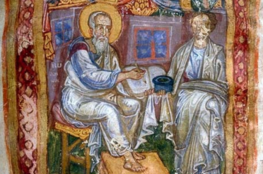It is possible, perhaps even likely, that the next generation of Christians living in America—Catholics, Orthodox, and Protestant alike—will die as either martyrs or apostates. If that is true, more will surely flee the Lord than flock to Him in their terrible hour of need. This is as it has been before, only today the attraction to depart from the easy yoke of Christ is practically a nonmatter for those who have come to believe that not only is hell inconsistent with a loving God, but that adherence to anything more than material interests is tantamount to madness. Of course, those Christians steeped in what I will broadly call “liberal mindset” are rather unconcerned about this, believing as they do that in the end libertas religionis will save us all. Even otherwise conservative Catholics who really ought to know better still think pitching some court battles and public-relations endeavors can spare them—and the Church—from any trying times. And if the trying times should come, then what? A separate, but not wholly indistinct, band of conservatives have nothing more to offer than, “Run!”
That is not what Christians have ever been called to do. But then again, never before in human history have Christians, those who are supposed to be in the world but not of it, been so tied to the things of this world. Earthly success, according to a crude and arguably degraded form of Christian thinking, is supposed to be a sign of grace. As often as Catholics (and some Orthodox and Protestants) decry this most unbiblical sentiment, most buy into it at some point in their lives. Or, worse, they come to accept very dubious claims about the “virtues of wealth” and the consistency of material riches with Christian living not because they themselves are in any sense saintly (or even moderately virtuous), but because such bottom-line (if not bottom barrel) thinking makes the contradictions of the present age go down a bit easier. No doubt it all goes down a lot easier with some fine wine and cheeses or, beyond that, posh vacationing “redeemed” by a bit of spiritual tourism.
A Catholic friend of mine once opined that the problem with contemporary Catholics is that they only know an existence of soft living—one without demands or much of a purpose beyond some pro forma religiosity. He thought, with some justification, that the Orthodox Church does a better job shaping at least some contingent of its followers to take a more three-dimensional approach to how they work out their salvation, one that demands (perhaps at times in too pharisaical fashion) regular rejection of sex, booze, and bacon—three pillars of a fully constituted American lifestyle. This is not to say that the Orthodox are, on average, holier or more steadfast in their faith than Catholics. It is at least possible, however, that when push comes to shove (and push shall indeed come to shove sooner rather than later), the Orthodox seem better prepared to handle the deprivations just over the horizon—even if some of their lay counselors don’t appear to be.



